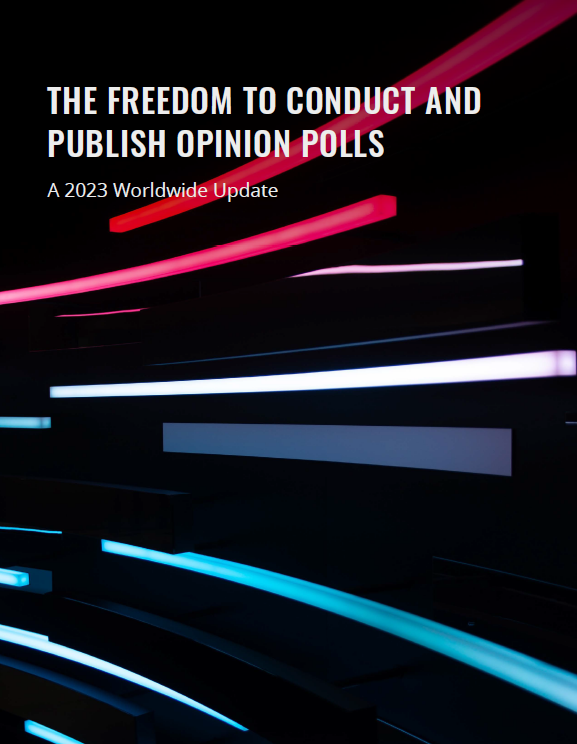Freedom to Publish Opinion Polls 2023
 This report covers the landscape for polling in 157 countries, making it the most extensive global review by these organizations. Practitioners in the 157 countries provided information about government laws and regulations concerning the freedoms to conduct polls and publish polling results, regulation of the industry, polling methods, the role of international associations and guidelines, the quality of media coverage of polls, and the availability of training for pollsters and journalists.
This report covers the landscape for polling in 157 countries, making it the most extensive global review by these organizations. Practitioners in the 157 countries provided information about government laws and regulations concerning the freedoms to conduct polls and publish polling results, regulation of the industry, polling methods, the role of international associations and guidelines, the quality of media coverage of polls, and the availability of training for pollsters and journalists.
There are both positive and negative findings in this latest ESOMAR/WAPOR study on the Freedom to Conduct and Publish Opinion Polls, the largest and most global of this series of studies, which began in 1984. The new study has more respondents, more question topics, and more information than ever before about the status of polling in the world.
Methods of polling are changing. In 2017, relatively few countries were using online polling as a research method. Now, more than threequarters do (with a high of 92% in Europe, where it has replaced telephones as the dominant polling mode). In-person interviewing has remained a dominant method everywhere but Europe. Telephones – landline, mobile, or in combination – have declined from 46% in 2017 to 35% today as the dominant mode of interviewing.
The positives:
- There is more awareness and understanding of international codes and guidelines. For some guidelines, awareness has doubled from what it was in 2017. But conformity with the codes is still lacking among many pollsters.
- Evaluations of the methodological quality of published opinion polling are generally high. In only 13% of countries is it considered of somewhat or very low quality (in Latin America and Asia Pacific Oceania one in five countries see low quality polling).
- Technological changes have helped make polling easier, and the COVID-19 pandemic brought some positive benefits to polling, along with the expected negatives.
- Professional associations that can address complaints about polls exist in only 30% of countries. While that is up from 24% in 2017, it is still smaller than the number of countries where a government body regulates polling.
Among the negatives:
- Although the share of countries with limits on the publication of pre-election polls has dropped to 46%, an additional 24 countries (15%) do not permit election polling at all.
- Governments in one-third of countries officially regulate polls.
- More than one in four countries have taboos on publishing surveys about religion, and one in five reject polling on crime and on voting.
- Many countries do not have access to in-country training in survey research.
- In 43% of the 157 countries, the quality of reporting about polls in the news media is rated as somewhat or very low quality, nearly twice as high as the share of countries who see local journalistic reporting as of somewhat or very high quality.
- Polling itself has become more difficult due to budget cuts, increased costs of data collection, and lowered response rates.
Regions like Latin America stand out as different in many areas. Latin America has the highest share of countries with pre-election poll embargoes. Nearly all countries report embargoes, and it is the region where embargoes are the longest on average (the median embargo length is seven days, though polling is more accurate the closer to election day it is conducted). In addition, more than any other region, Latin American countries report that personal interviewing is not safe. Nearly half of countries there (47%) believe that interviewers conducting face-to-face surveys are either somewhat or very unsafe, almost three times the global percentage.
Europe is the region with the second largest percentage of embargoes (behind Latin America), but for half of those countries, the restrictions on publication last only two or three days. European countries, as well as those in Sub-Saharan Africa and North America & the Caribbean, are also the most likely to have professional associations to deal with complaints about polling and to promulgate standards.
While it appears from the tables that parts of Asia Pacific Oceania and Sub-Saharan Africa might not have pre-election restrictions on the publication of polls, in nearly a third of those countries in West Asia & North Africa and Sub-Saharan Africa, it is not permitted to publish polls about elections and voting (in about a quarter of countries in those two regions, polls about voting cannot even be conducted).
ESOMAR and WAPOR plan to use these results to publicize issues about polling regulations and the value of self-regulation. Polls provide a voice for the public and are an important means of letting both leaders and the public themselves understand what people want and need.
THE FREEDOM TO CONDUCT AND PUBLISH OPINION POLLS: A 2023 Worldwide Update
Freedom to Publish Opinion Polls Questionnaire 2022
Copyright © ESOMAR/WAPOR 2023
Founded in 1948, ESOMAR-The World Association of Research Professionals is the international body representing established marketing specialists. With over 3,500 members in over 90 countries, ESOMAR stands for the highest possible standards, both professionally and technically.
Founded in 1947, the World Association for Public Opinion Research- WAPOR aims to further the use of scientific survey research in national and international affairs. There are over 600 members in more than 120 countries.
ESOMAR – The World Association of Research Professionals
Vondelstraat 172
1054 GV Amsterdam
The NetherlandsTel: +31-20-664 2141
Fax: +31-20-664 2922
E-mail: email@esomar.org
Internet: http://www.esomar.org
World Association for Public Opinion Research
University of Nebraska-Lincoln
539 Oldfather Hall
Lincoln, NE 68588-0367
USA
E-mail: waporoffice@gmail.com


